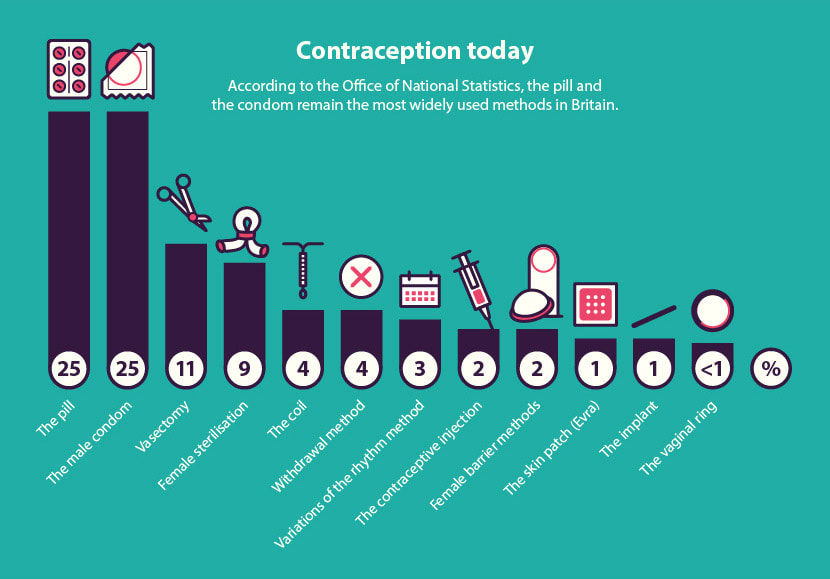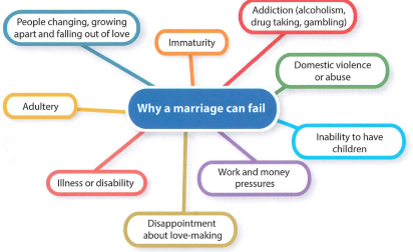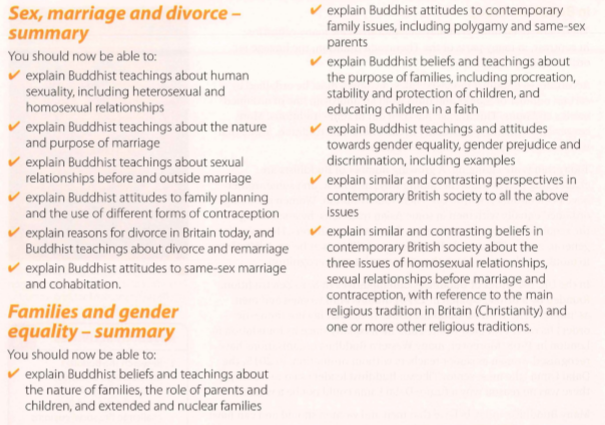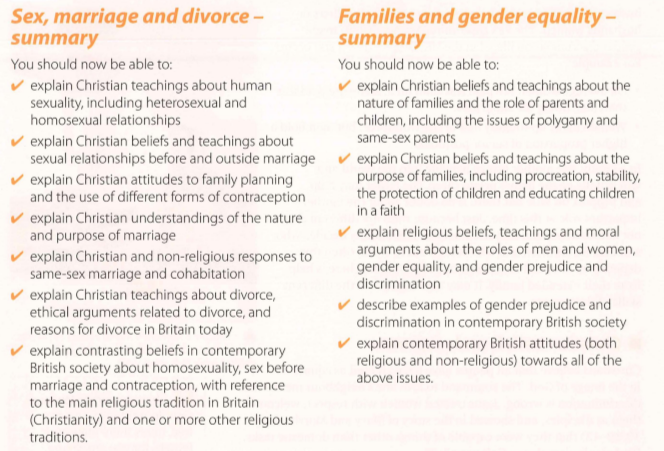Relationships and families
Lesson One: Human Sexuality
|
Human sexuality refers to the way people express themselves as sexual beings. People begin to have sexual feelings at puberty. This is a natural part of human biology that usually leads to intercourse with the opposite sex and reproduction (having children).
A heterosexual relationship is a sexual relationship with a member of the opposite sex; that is, between a man and a woman. A homosexual relationship is a sexual relationship with a member of the same sex, either between a man and another man or a woman and another woman. 1885 Sexual acts between homosexuals are made illegal 1967 Homosexual acts were declared legal for people over 21, except in the armed forces 1994 Age of consent for homosexual acts is reduced to 18 2000 Homosexuals are allowed to serve in the armed forces 2001 Age of consent for homosexual acts is reduced to 16 2004 Civil partnerships are recognised in law 2013 Same-sex marriage is recognised in law Christian view
Many Christians see heterosexual relationships as part of God's plan for humans. Genesis says that a man and woman should be united together and 'increase in number' (Genesis 1:28 and 2:24). This is why many Christians are opposed to sex outside marriage, and some are strongly against homosexual relationships and artificial contraception. Other Christians believe that the most loving thing to do would be to adapt their teachings to fit a changing world. Christians, like many other people, have different opinions about homosexuality. Those who oppose it may base their views on Leviticus 18:22 and 1 Corinthians 6:9-10, where is it written that sexual relationships between two men are forbidden. The precise meaning of these passages is contested among Christians. The Bible includes no specific detail regarding homosexual relationships between women, and there is nothing in the Bible that prohibits homosexual relationships that do not involve penetrative sex. The Catholic Church teaches that homosexual people are not sinful because of their homosexuality, but that they should remain chaste (not have sex) to avoid sinful acts. The Church of England welcomes homosexual Christians who live in a faithful, committed relationship, but it does not allow them to marry in church. Some Christians think Bible texts need to be interpreted in the context of modern society, and therefore consider loving, faithful homosexual relationships to be just as holy as heterosexual relationships. |
Contemporary British Society
Many people in Britain today, whether religious or not, agree with the Buddhist viewpoint that sexual acts should be loving and respectful, and that sex which is purely driven by physical desire may cause emotional harm to those involved. Many people in Britain believe this approach should apply equally to homosexual and heterosexual relationships, and to sexual relationships within or without marriage. However, there are a wide range of views in British society about how sexuality should be expressed. Some people, including many Christians, believe that sex expresses a deep commitment that should be reserved for marriage. Some people wait to find someone they love before having sex, while others think that casual sex is fine, providing it doesn't cause any harm. There has been considerable debate in the UK about whether Christian Churches should carry out same-sex marriages or not. Currently, same sex marriage is legal in the UK, but same-sex couples are not allowed to get married in most churches. The Catholic Church teaches that homosexual acts are sinful and that homosexuals should refrain from having sex. This contrasts with the widely held view in British society that homosexuals should be entitled to the same rights as anyone else, including the right to marry and the right to have sexual relationships. Buddhist view
Buddhist views on sex differ greatly from country to country, perhaps in particular between Buddhists in Asia and the West. Buddhism teaches that sex is not wrong, shameful or embarrassing. It acknowledges that everyone has passions and that these should not be avoided or denied. For example, Roshi Robert Aitken (a Zen Buddhist teacher) once said: '' For all its ecstatic nature, for all its power, sex is just another human drive. If we avoid it just because it is more difficult to integrate than anger or fear, then we are simply saying that when the chips are down we cannot follow our own practice. This is dishonest and unhealthy. '' “There is a middle way wherein sexuality is fully acknowledged and regarded compassionately without the need to indulge in actions which lead to suffering. '' Daishin Morgan (the abbot of Throssel Hole Abbey in Northumberland, UK). However, as sexual attraction generally involves craving ( tanha), which is one of the main causes of suffering in Buddhism, it is important for Buddhists to approach sex ethically. Buddhists believe that their sexual behaviour, as in other areas of life, should be guided by kindness, generosity, honesty and awareness, not causing harm to oneself or others. Most Buddhist monks and nuns take a vow of celibacy when they become ordained. This means they choose to avoid sexual activity as one aspect of a simple life devoted to meditation and study. The Buddha did not give teachings related to same-sex relationships. Many Buddhists, particularly in the West, would say that the five moral precepts apply as much to same-sex relationships as to opposite sex relationships. What matters is that there is consent and respect, regardless of the gender of the people involved. |
Lesson two: Marriage
|
Marriage is a serious, lifelong, public commitment. It is a legal contract that brings security to a relationship and protects the rights of each partner. Until recently, marriage in the UK was defined as the legal union of a man and a woman. In 2004, same-sex couples were allowed to register their union in a civil partnership which gave them the same legal rights as married couples. Same-sex marriages became legal in England, Wales and Scotland in 2014, and in Ireland in 2015.
A growing number of couples in Britain choose to live together without getting married. This is called cohabitation. Buddhist view
Purpose of Marriage Buddhism does not view marriage as a religious duty or sacred act. This does not mean that Buddhism is against the idea of marriage, just that marriage is regarded as a social contract and not a religious rite. Marriage is a personal choice that a couple make for themselves. Buddhist weddings are secular, not religious, occasions-the couple are expected to follow the civil laws for marriage for whichever country they are getting married in. Monks may bless the marriage after the wedding ceremony, but they cannot conduct the ceremony itself. Unlike some religions, having children is not viewed as an important purpose of marriage in Buddhism. Buddhists are not expected to feel any religious obligation or pressure to have children; it should purely be the personal choice of the couple. This contrasts with Christianity for example, and particularly Catholicism, where marriage is seen as the starting point for raising a family. Buddhism teaches that everything is interrelated and interdependent. Buddhists believe this is true for people as well, and that strong, trusting relationships are important for the wellbeing of a community and society as a whole. Marriage is seen to play an important part in this, and for Buddhists it helps to cement the relationships that provide support, protection and happiness for the community Sex before and outside marriage Sex before marriage is not forbidden in Buddhism. Individual Buddhists may believe in waiting until marriage to have sex, but this is more likely to be for personal reasons rather than religious ones, and is likely to be influenced by local customs and traditions. For many Buddhists the most important thing is to live by the five moral precepts, and to make sure that sexual acts are respectful and loving, with the full consent of both people involved. Likewise, views on cohabitation vary between Buddhists and in some societies it is not seen as acceptable, but this is not something that Buddhism teaches is wrong. Most Buddhists would regard adultery as unskilful, because it generally involves dishonesty, and does not show kindness towards or awareness of the feelings of the person being cheated on. Same sex marriage Legally recognised same-sex marriage is a fairly recent development. It was first legalised in 2011 in the Netherlands, and only a minority of countries around the world have so far followed suit (including the UK). It is currently illegal in Asia. However, Buddhist teachings are not against same-sex marriage, and traditional Buddhist cultures that might have condemned same-sex marriage some years ago now seem to be changing slowly. In places such as Hong Kong, Taiwan, South Korea and Japan, there have been recent challenges to the law, to promote the view that the right to marriage should be equally available for heterosexual and homosexual couples |
Sex before marriage
In the past sex before marriage was considered shocking, particularly for a woman. This is still true in many cultures around the world, where a woman who has sex before marriage may be asked to leave her home for bringing disgrace to her family. In the last 50 years or so attitudes have changed in British society. Sex before marriage is now widely accepted. Many films, television programmes, books and magazines reflect the common belief that it is usual for couples who are dating to have sex. Christian view
Sex before and outside marriage Many Christians believe sex expresses a deep, loving, lifelong union that first requires the commitment of marriage. They believe it is important to be sexually pure (chaste) before marriage because having sex is part of the loving, trusting relationship that should be developed within a marriage; it should not just be a casual, temporary pleasure. Christians believe it is wrong to use people for sex, and irresponsible to spread sexually transmitted infections or risk pregnancy. In the Bible, Paul urged sexual restraint: '' Flee from sexual immorality. All other sins a person commits are outside the body, but whoever sins sexually, sins against their own body. Do you not know that your bodies are temples of the Holy Spirit, who is in you, whom you have received from God? You are not Your own. '' 7 Corinthians 6:7 8-7 9 [NIV] Although the Anglican and Catholic churches teach that unmarried people should not have sex, some Christians accept that for some people sex before marriage is a valid expression of their love for each other. All religions place a high value on faithfulness in marriage. Adultery means having a sexual relationship with someone who is not your spouse. Many non-religious people agree with Cihrstians that sex outside marriage is wrong because it involves secrecy, lies, and a betrayal of trust. It can affect children and cause pain to all concerned. Adultery breaks the promises Christian couples make before God during their wedding, to forsake all others and be faithful to each other as long as they both shall live. It threatens the stable relationship needed between parents for their children's security. The Bible commandment is clear: '' You shall not commit adultery. '' Exodus 20:74 [NIV] Jesus taught that lust, which could lead to adultery, is also wrong: '' You have heard that it was said, 'You shall not commit adultery.' But I tell you that anyone who looks at a woman lustfully has already committed adultery with her in his heart. '' Matthew 5:27-8 [NIV] Jesus forgave a woman who was caught in adultery, but ordered her to 'go now and leave your life of sin.' (John 8:1-11). For Christians, marriage is an unbreakable bond that demands total faithfulness. The purpose of marriage Marriage was one of God's gifts at creation. It is natural for a man and woman to leave their parents and become 'one flesh' through which they bring new life into the world. '' That is why a man leaves his father and mother and is united to his wife, and they become one flesh. '' Genesis 2:24 [NIV] '' God blessed them and said to them,"Be fruitful and increase in number; fill the earth and subdue it ... '' Genesis 1:28 [NIV] Some Christians believe that marriage is a sacrament, a lifelong union blessed by God, that reflects the sacrificial love of Jesus, and a covenant (agreement) before God in which the couple promises to live faithfully together until death. The couple's physical intimacy expresses their love. They share companionship through good times and bad, and try to bring up their children in the way that God wants. Marriage is a spiritual bond of trust that reflects the love of God. The couple should love each other 'as Christ loved the church' (Ephesians 5:25). '' The Church sees marriage between a man and a woman, as central to the stability and health of human society. '' House of Bishops of the General Synod of the Church of England For Christians, the purpose of marriage is to provide a stable, secure environment for family life. It is the proper place to enjoy a sexual relationship, bring up children within a religious faith and provide lifelong support and companionship for a partner. '' I, N , take you, N , to be my wife [or husband], to have and to hold from this day forward; for better, for worse, for richer, for poorer, in sickness and in health, to love and to cherish, till death us do part; according to God's holy law. In the presence of God I make this vow. '' The marriage vows from an Anglican wedding service Cohabitation Sometimes the cost of marriage prevents people from marrying immediately. In contemporary British society many couples live together without being married. This is called cohabitation. Some want to see if their relationship is going to work, and then may decide to marry if they are starting a family. Others never marry, but live and raise their children together in a loving partnership. Christians who are opposed to sex before marriage believe cohabitation is sinful. The Orthodox Church, for example, is opposed to any recognition of a sexual relationship outside a Christian marriage. The Catholic Church agrees: '' The sexual act must take place exclusively within marriage. Outside of marriage it always constitutes a grave sin.'' Catechism 2390 Many Anglican and Protestant Christians accept that although marriage is best, people may live together in a faithful, loving and committed way without being married |
Lesson Three: Contraception and family planning
|
Contraception is a way of preventing pregnancy when a couple have sex. There are a range of different types of contraception available in Britain today, which prevent pregnancy from happening through various methods.
These include: • the pill, which stops the woman from producing an egg in the first place • the diaphragm and the condom, which stop the sperm from meeting the egg • the morning -after pill, which stops a fertilised egg from implanting in the womb - some people consider this method to be a form of abortion • natural contraception, which involves only having sex at certain times in the woman's menstrual cycle, when she is less likely to conceive • sterilisation, which involves a surgical operation and is more permanent. Buddhist view
Buddhist traditions differ in their thinking about when consciousness arises in a new life. Some might say that it begins at conception (when the egg meets a sperm). Others might say that consciousness is continuous, from life to life. Most Buddhists believe it is fine to use forms of contraception that prevent fertilisation from taking place. Some Buddhists would consider contraception that works by preventing a fertilised egg from implanting in the womb (such as the morning-after pill) to be less acceptable. This is because they might see it as a form of killing, which breaks the first moral precept. On the other hand, if giving birth to a child might cause serious harm, for example by threatening the mother's life, or if she already has children she struggles to feed, then a Buddhist might decide to choose the morning-after pill as the lesser of two harms. Although the Buddha taught all kinds of people, including parents, according to the early scriptures he did not recommend family life as the best path by which to reach enlightenment. Unlike in most other religions, having children is not regarded as a sacred duty for Buddhists. They are free to make their own choices about whether or not to have a family, but Buddhist teachings suggest that they should plan a family responsibly, and only have children if they can bring them up in a happy and safe environment |
Christian view
All Christian churches agree that having children is God's greatest gift to a married couple. Christian couples are called by God to be responsible parents, fully committed to their children's nurture and guidance. It is God's will that children are born within marriage, but all Christian churches accept that there are some situations when it may be acceptable to avoid bringing children into the world. The reasons may be economic, environmental, physical or psychological. However, Christian churches do not all agree on the methods couples should use to limit their families or to time the births of their children. ' ' Every sexual act should have the possibility of creating new life. '' Humanae Vitae, 7 968 The Catholic and Orthodox Churches teach that artificial contraception goes against natural law (the moral principles that are part of human nature). God's purpose for marriage is to have a family. The Catholic Church believes that sex is for making new life as well as expressing love and that these two purposes should not be separated. The Catholic Church teaches that using artificial contraception is sinful because the couple are not being open to new life and so are preventing God's plan. Its use could encourage selfishness or infidelity. The Catholic Church is not against family planning, but thinks that parents should use the rhythm method to space the births of their children. Many people disagree with this teaching because they think natural methods can be less reliable and they see no reason not to use methods developed by medical science, as long as these do not cause an abortion. Furthermore, the population explosion and spread of AIDS present new challenges to this teaching. Many other Christians, as well as Muslims and Jews, will naturally want to have a family, but they do not want every sexual act to potentially lead to conceiving a child. Anglicans and Nonconformist Christians accept that people should only have as many children as they are able to care for. It would be unfair to bring a baby into a life of deprivation. They allow contraception to enable couples to develop their relationship before having children, or to space out pregnancies to avoid harming the mother's health. The Church of England approved the use of artificial contraception in 1930:'' The Conference agrees that other methods may be used, provided that this is done in the light of Christian principles. '' Lambeth Conference,1930 Many Christians do agree that some forms of contraception should not be used because the egg may already be fertilised and therefore conception has taken place. The coil and the morning after pill prevent the egg from developing, which some people see as causing an abortion. Christians, and many other religious people who believe in the protection of human life from the moment of conception are opposed to these methods. |
Lesson Four: Divorce
|
In England and Wales in 2012 an estimated 42 per cent of all marriages ended in divorce. Divorce is allowed after one year of marriage if the marriage cannot be saved. A legally recognised civil divorce must be obtained through a court. Remarriage is allowed as many times as people wish, to a different partner or to their original spouse .
When couples stop communicating with each other, it can lead to resentment, arguments and instability for children in the family. Christian churches try to prevent this by offering courses that prepare couples for marriage. Christians have to balance ethical arguments between the sanctity of their marriage vows and compassion for those who are going through a breakdown of their marriage. While many would say that vows made before God are sacred and should never be broken, there may be circumstances when it might be more compassionate and loving to divorce, for example in cases of domestic violence that risk the health and safety of a partner or their children. Christian view
In the Bible, Jesus taught that anyone who divorced and remarried was committing adultery: '' He answered,'Anyone who divorces his wife and marries another woman commits adultery against her. And if she divorces her husband and marries another man, she commits adultery. '' Mark 70:77-12 [NIV] It is worth noting that Matthew 5:32 adds 'if a man divorces his wife for any cause other than unchastity (unfaithfulness) he involves her in adultery.' [NIV] The Church helps divorced people but must also keep marriage sacred. Christians believe that vows made in God's presence should be kept. The Catholic Church teaches that a civil divorce cannot dissolve a marriage between two baptised people. Catholics can separate but they cannot marry someone else in a Catholic church while their partner is still alive. For Catholics, marriage is a sacrament that is permanent, exclusive and lifelong, and the couple make vows before God that can never be broken. However, Catholics can obtain an annulment under certain circumstances if it was never a true marriage. Catholics whose marriage has been annulled are free to marry in church. Other Christians think that although marriage is for life, sometimes divorce is the lesser of two evils. Divorced Anglicans can marry someone else in church with the bishop's permission, as long as the priest in that church is willing to perform the marriage ceremony. Priests who are uncomfortable with this may instead offer a blessing after a civil ceremony Other Protestant churches, for example the Methodist or United Reformed Church, accept civil divorce and allow remarriage in church as long as the couple take the vows seriously. They think that the Church should reflect the forgiveness of God and allow people who have made mistakes the opportunity to find happiness in a second marriage. The Eastern Orthodox Church grants divorces and remarries couples, but usually not more than twice. |
Buddhist view
In Buddhism, there is no law stating that a husband and wife cannot be separated if they cannot live together harmoniously. However, Buddhism also teaches an approach to life that includes implied duties and responsibilities between a husband and wife. If followed, these are hoped to lead to a long and healthy relationship together. Divorce rates are typically much lower in Buddhist countries than they are in the UK. One reason for this is that people in these countries more commonly get married later in life, when they tend to be more mature and more certain about what they want from a relationship. Another reason is that divorce is traditionally not approved of by society as a whole. This means that couples tend to put more effort into trying to mend a relationship, supported by the help of their family, friends and local community, because divorce is very much seen as a last resort. Most Buddhists agree with this view of divorce. Through the help of Buddhist teachings-such as developing loving-kindness and following the five moral precepts they would work hard to try to improve the marriage. Buddhists would only consider divorce when it is no longer possible to reconcile the relationship, and so divorce is preferable to living together and suffering. Most Buddhists would argue that clinging to an attachment that produces suffering goes against the Buddha's teaching. Divorce is an acceptable solution if it is seen to be the only way to reduce a couple's suffering. Buddhism teaches that the best way to deal with divorce is to go about it sensibly and sensitively. It is likely that people will suffer as part of the process, but the couple should try to avoid anger and unkindness towards one another. Buddhism teaches that hurting another person in the process of divorce can never make the person who is causing the hurt to be happy or satisfied. As with divorce, views on remarriage vary between Buddhists in different countries and traditions, but it is not something that Buddhist teachings are against. For many Buddhists, remarriage can be seen as an opportunity for someone who has divorced to commit to a new relationship, creating happiness for themselves and their partner, and thus reducing people's suffering. |
Lesson Five: Nature of Families
|
Family life has changed over the years but the family is still considered the best environment for bringing up children and keeping society stable. The basic unit of mother, father and children (a nuclear family) is still most common in the West, although in the UK approximately 25 per cent of children now live in single-parent families. There are more 'stepfamilies', where divorced people with children marry new partners with children of their own. Same sex couples may have children from previous relationships, legally adopt children, conceive through in vitro fertilisation (IVF), or use surrogates.
In the past, families were larger, and often included grandparents and other relatives (an extended family) living together. For many non Western cultures, the extended family unit is still very common. Many of the values and responsibilities that Buddhists aim to uphold within the family- such as love, respect, trust, and providing a good education- are similarly respected by many families in Britain today, regardless of their faith. There are some differences though between the values of Buddhism and other faiths. For example, greater emphasis is placed by Catholic Christians, Muslims and Sikhs on having children. Good parents love, care for and raise their children to know right from wrong. Religious parents are generally expected to raise their children within their faith . The Catholic Church describes parenting like this:
'' Here one learns endurance and the joy of work[ ... ] love, generous- and even repeated- forgiveness, and above all divine worship in prayer and the offering of one's life. '' Catechism 1657 Christian parents want their children to grow up with values such as respect for all life, generosity, compassion, loyalty and the ability to form loving relationships. They want them to be able to think for themselves and to have self-discipline, listen to others and be tolerant of others' views, while at the same time remaining true to themselves. '' Anyone who does not provide for their relatives, and especially for their own household, has denied the faith and is worse than an unbeliever. '' 1 Timothy 5:8 [NIV] Christians are commanded to love one another. They believe the way they relate to one another is important to God. Since, for Christians, love is at the heart of all relationships, they place a very high value on family life because it is in a family that a child learns to love. In Biblical times many people lived in extended families or 'households'. The entire family group looked after the children and provided for everyone's welfare, old and young alike. The extended family passed on the religion, customs and traditions of the society to the next generation. The commandment to 'Honour your father and your mother' (Exodus 20:12), particularly when parents are elderly and need support, is an important Christian belief today. There are examples in the Bible of people who practised polygamy, and there was a law that protected inheritance rights of the firstborn child (Deuteronomy 21:15-16). However, Christians believe the ideal marriage of one man and one woman for life was created at the beginning. Paul makes it clear that each man should have his own wife and each woman her own husband to avoid sexual immorality (1 Corinthians 7:2). Polygamous marriages cannot be performed in Britain as bigamy is illegal. Some traditional Christians disapprove of same-sex parents because they feel the ideal is for children to grow up with a male and female role model as parents. Other Christians say that it is more important for children to be in a secure and loving family regardless of the gender of their parents. |
Buddhism is not an especially family-centred religion. For Buddhists, there are no religious pressures or expectations to get married or to procreate. Both of these decisions should be a personal choice, although they may be influenced by the customs and traditions in the person's country.
Buddhist family life usually reflects what is normal for the family's country. For example, in Buddhist countries such as Thailand and Sri Lanka, extended families are very common. Parents, children, grandparents and other relatives may all live together, helping to raise the children and supporting one another in a large family unit. In the West, nuclear families are more common, consisting of a mother, father and their children living together. The Buddha did not forbid polygamy, but he did suggest that it would probably cause suffering to those involved. The implication is that while polygamy is tolerated in Buddhism, it is not the favoured family model. However, the Buddha taught that if a family is built on respect and love for each other then it does not matter who it consists of, as long as it respects the laws of the family's country. A similar approach can be taken to the issue of same-sex parents. Buddhist teachings suggest that the values, morals and love shown in a family are more important than the gender of the parents. '' Social life begins with our parents; the intellect is cultivated through our teachers; family life is adjusted through experience; the world is appreciated through friends and relations; interdependence is realised through our employment and our final goal is achieved through spiritual guides. '' Medagama Vajiragnana Nayaka Thera I (former Head of the London Buddhist Vihara) |
Lesson Six: Purpose of the family
|
In the UK today the nuclear family is still the most common type, although approximately 25 per cent of children now live in single parent families. There are also more stepfamilies, where divorced people with children marry new partners with children of their own. Same-sex couples may have children from previous relationships, legally adopt children, conceive through in vitro fertilisation (IVF), or use surrogates.
Many of the values and responsibilities that Buddhists aim to uphold within the family- such as love, respect, trust, and providing a good education- are similarly respected by many families in Britain today, regardless of their faith. There are some differences though between the values of Buddhism and other faiths. The family is the main building block of any society. It is where procreation chiefly takes place and where the basic needs of children are provided. Happy, healthy families create stability for their members and stability in society itself. The protection of children is an important part of family life. This is why it is particularly distressing when cases of child abuse within families come to light. The family is where people learn to live as part of a community: parents teach their children right from wrong and how to get along with others.
The idea of family is deeply ingrained in Christian beliefs about God. Christians believe God reveals himself as a Father, with Jesus his Son and humankind his children. God created life and so loves and cares for it. An important role of Christian parents is educating children in their faith. Christian parents are expected to be good role models for their children and to teach them moral values. Many Christian parents will nurture the spiritual lives of their children and make daily prayer part of the family routine. Some families send their children to faith schools, or to groups run by their church, in order to further their children's education in their faith. For Christians, a family reflects the relationship of 1 Christ and the Church: '' Husbands, love your wives, just as Christ loved the Church and gave himself up for her. '' Ephesians 5:25 [NIV] The Christian Church teaches that both parents and children have responsibilities to one another. The commandment to honour one's father and mother (Exodus 20:12) applies to children of all ages, so it includes the respect and care given to the elderly members of a family. '' Listen to your father, who gave you life, and do not despise your mother when she is old. '' Proverbs 23:22 [NIV] Christians believe their children are gifts from God, and they must respect their human dignity: A Christians develop the spiritual lives of their children '' Children are a heritage from the LORD, offspring a reward from him. Like arrows in the hands of a warrior are children born in one's youth. Blessed is the man whose quiver is full of them ... '' Psalm 727:3-5 [NIV] But children, too, have responsibilities to obey, love and respect their parents for all they have done to help them grow into mature adults: '' Children, obey your parents in everything, for this pleases the Lord. Fathers, do not embitter your children, or they will become discouraged. '' Colossians 3:20-2 7 [NIV] |
The Buddha gave no explicit rules about how family life should be conducted, but he did give advice on how families can live happily together, based on respect and love for one another. In Buddhist families, husbands and wives are expected to respect and honour each other, to cultivate love and trust towards each other, and to remain faithful to each other. Buddhist parents should love and care for their children, and provide a stable and safe environment in which they can grow up. They should try to practise the four sublime states (loving kindness, compassion, sympathetic joy and equanimity) when raising their children. They are responsible for teaching their children good morals and values, and for giving them a good education. They should be able to support their children and make sure they are provided for in the future.
Parents are also responsible for ensuring their children are taught Buddhist beliefs and practices. Families usually have a shrine dedicated to the Buddha in their home, and they teach children how to show respect and gratitude to the Buddha in front of the shrine. Parents should also involve their children in the local religious community, attending services and participating in festivals. Children are expected to be obedient and to respect their parents and other relatives. As they grow up, they are expected to preserve the traditions of the family. Later in life, they should support their parents when old age or illness become an issue. |
Lesson Seven: Gender Equality
|
Gender equality means that men and women should be given the same rights and opportunities as each other. Many people in Britain today agree with the idea of gender equality, but there are also many examples where it does not happen.
Gender prejudice is the attitude that women are not as good as men, or that men are not as good as women. It assumes that men or women should behave in a certain way, or have certain strengths or weaknesses because of their gender. which is often based on sexual stereotyping. An example of this is the idea that women are more naturally caring or are the weaker sex, so they should look after the home while men go out to work. Gender discrimination turns this attitude into action and affects how people treat others. For example, an office manager might be prejudiced against women because he does not think they are as reliable as men. If he decides not to employ any women as a result, this is an example of gender discrimination. The roles of men and women In the past, men had positions of power in society and more rights than women. For example, women were not allowed to vote or divorce their husbands, and had to do almost entirely what their fathers or husbands wanted. The Sex Discrimination Act (1975) made gender discrimination illegal in the UK. Despite this, it still occurs. For example: On average women are paid less than men; some are paid less than men doing the same jobs. Women make up roughly half of the workforce, but men hold a higher proportion of senior positions. In a family, the mother brings new life into the world and will usually be the baby's prime carer. The father may help and support his wife but there is no doubt about the mother's important role at this time. Just because roles are different does not necessarily mean they are unequal. Each family decides who will care for children and who will go out to work; often this depends on financial considerations and whether there is help from their extended family. It may also depend on the different skills of the parents. Christians believe that all people have been created as equals in the image of God. The command to love one's neighbour means that discrimination is wrong. Jesus treated women with respect, welcomed them as disciples, and showed in the story of Mary and Martha (Luke 10:38-42) that they were capable of things other than domestic tasks. Paul emphasises this in ' There is neither Jew nor Gentile, neither slave nor free, nor is there male and female, for you are all one
in Christ Jesus. '' Galatians 3:28 [NIV] Some traditional Christians believe that men are the head of the family and that women should mainly stay at home and care for children. This may stem from a literal interpretation of Bible texts that reflect the position of women at the time they were written. For example, in Genesis 3:16 God punishes Eve for her disobedience, saying: '' [. .. ]with painful labour you will give birth to children. Your desire will be for your husband, and he will rule over you. '' Genesis 3:16 [NIV] Most Christians today see marriage as an equal partnership where the different gifts of each person, male and female, strengthen family life. |
In early Buddhism
During the time of the Buddha in ancient India, women were generally seen as inferior to men and had a very low position in society. They were not allowed to participate in religious life, had very limited freedom, were usually not allowed an education, and were primarily expected to act as housewives. It is difficult to know what the Buddha's attitude was towards women because the scriptures containing his teachings are inconsistent. Historians are not sure whether these inconsistences come from the Buddha himself or those who later wrote down his teachings. For example, although the scriptures show him teaching that women and men have equal potential for enlightenment, they also portray him as having originally refused to ordain women as nuns, saying that doing so would mean that his teachings would die out twice as fast. However, he did eventually agree to ordain women, having been asked again, this time by his aunt, who brought him up after the death of his mother. At the time, giving women this amount of religious freedom was very unusually liberal, and it can be argued that his initial reluctance stemmed from his understanding that, given women's low status, his teachings would be taken less seriously if associated with women. The Aparimitayur Sutra suggests women must be reborn as men before they can achieve enlightenment. Some Buddhists still believe this today. In contrast, the Lotus Sutra teaches that men and women are equal in their ability to practise Buddhism and attain enlightenment. In Buddhism today There have been nuns in Mahayana Buddhism for many centuries. In contrast, in many parts of the Theravada tradition, the lineage for ordaining nuns has died out. According to Buddhist monastic rules, a woman must be ordained by a certain number of monks and nuns from an unbroken line of ordained monks and nuns. This lineage has died out in some traditions. More conservative monks, particularly in the Theravada tradition, argue that women can therefore no longer be ordained. Today things are changing. A growing number of Buddhists are challenging this situation or finding ways around it, and some women have been ordained within the Theravada tradition. Women are being ordained equally with men in some Asian traditions, by assembling the required number of senior nuns from other traditions. However, in general, nuns in Theravada Buddhism are still seen as being subservient to monks, and are not given the same respect and recognition. In the UK, the Order of Buddhist Contemplatives (a So to Zen tradition, founded by a British woman in 1978) ordains both women and men as 'monks'. The Triratna Buddhist Order (a neither lay nor monastic order) has also ordained women and men equally since its foundation in London in 1968. Moreover, many Western Buddhist organisations have recognised women as senior teachers without ordination. In 2015, the Dalai Lama (the most senior Tibetan Buddhist leader) said he believed there was no reason why a future Dalai Lama could not be a woman. Many Buddhists today believe that men and women should and can have equal status within Buddhism. Where gender inequality still exists, it is mainly in more conservative traditions and countries, where it tends to reflect local belief and custom. |























